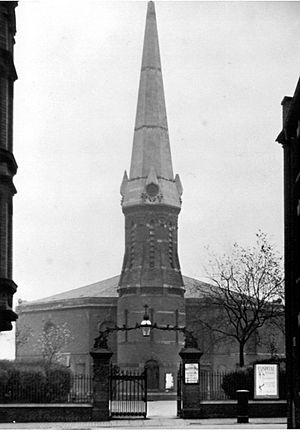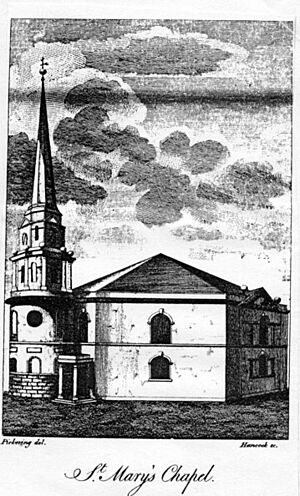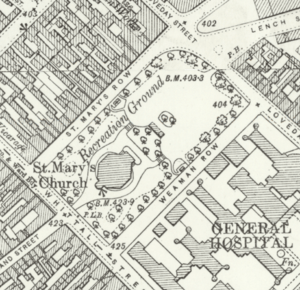St Mary's Church, Whittall Street, Birmingham facts for kids
Quick facts for kids St Mary’s Church |
|
|---|---|

St Mary's in 1880, with the remodelled tower
|
|
| 52°29′6.2″N 1°53′46.4″W / 52.485056°N 1.896222°W | |
| Location | Whittall Street, Birmingham |
| Country | England |
| Denomination | Church of England |
| History | |
| Dedication | St Mary the Virgin |
| Consecrated | August 1774 |
| Architecture | |
| Architect(s) | Joseph Pickford |
| Style | Neo-classical |
| Completed | 1774 |
| Construction cost | £4,700 |
| Closed | 1925 |
| Demolished | 1920s |
| Specifications | |
| Capacity | 1,000 people |
| Number of spires | 1 |
St Mary's was a Church of England church located on Whittall Street in Birmingham, England. It was an important building in the city for over 150 years.
Contents
History of St Mary's Church
Building the Church
St Mary's Church was built in 1774. It was located on Catharine Street, which is now known as Whittall Street. At that time, this area was on the northern edge of Birmingham. The church was designed by an architect named Joseph Pickford.
The church was named St Mary's because a woman named Mary Weaman donated the land for it. She also gave £1,000 towards the building costs. The total cost to build the church was about £4,500.
Early Days and Changes
Soon after the church opened, a part of one of its balconies collapsed during a church service. Luckily, no one was hurt. After this, strong Cast iron columns were added to support the rebuilt balconies.
A writer named William Hutton wrote about St Mary's in 1783. He said the church was built in an octagon shape. He thought it looked nice but had a small steeple and a large roof. He also joked that the clock rarely showed the correct time because it had "NO WORKS within," meaning it didn't have a working mechanism.
In 1786, a famous religious leader named John Wesley visited St Mary's. He attended a service and listened to a sermon by the church's first leader, Edward Burn.
Becoming a Parish Church
For many years, St Mary's was a "chapel of ease" for St Martin in the Bull Ring. This meant it was a smaller church built to help the main parish church. In 1841, St Mary's was given its own parish. This made it an independent church with its own local area to serve.
A Sad Event
In 1859, a tragic explosion happened at a nearby factory called Messrs Pursall and Philips Percussion Cap Manufactory. This factory was also on Whittall Street. Many people died in the explosion. Fifteen women who died were buried together in a single vault at St Mary's Church.
Repairs and Rebuilding
In 1866, engineers found some problems with the church's structure. Because of this, the tower and spire were rebuilt. They were changed to a Gothic style, which was popular at the time. The church building was rebuilt again later on.
The Church's End
In 1925, St Mary's Church was closed. It was going to be taken down to make space for the expansion of Birmingham General Hospital. The church's parish was then combined with another church, Bishop Ryder Church. The money from selling the land where St Mary's stood was used to build a new church. This new church, also called St Mary's Church, was built in Pype Hayes.
Today, the site where St Mary's Church once stood is occupied by a building called Waterfall House. However, a street nearby is still named St Mary's Row, reminding people of the church that used to be there.
Important Items and Memorials
Some historical items from St Mary's Church are still preserved. The church's records of baptisms (from 1774 to 1812) and burials (from 1779 to 1812) are kept at St Martin's Church. Most of its silver communion service is now at St Mary's Church in Pype Hayes. Two special silver flagons from the service are part of the collection at the Birmingham Assay Office.
There was also a special plaque inside St Mary's Church. It remembered William Thompson, who was the first President of the Wesleyan Methodist Conference. This plaque is now located in St Martin in the Bull Ring.
Vicars of St Mary's
The vicar is the main priest or minister in charge of a Church of England parish. Here are some of the vicars who served at St Mary's Church:
- John Riland (until 1810)
- Edward Burn (1810 - 1837)
- John Casebow Barrett (1837 - 1880)
- John Stanley Owen (1881 - 1886)
- J. Foster Pegg (1886 - 1892)
- Herbert Aylwin (1900 - 1905)
- H.M. Foyl (1905 - 1910)
- W.F.W. Hunter (1910 - 1925)
Images for kids
 | Kyle Baker |
 | Joseph Yoakum |
 | Laura Wheeler Waring |
 | Henry Ossawa Tanner |




